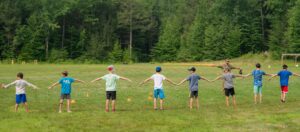Now you might be thinking that this statement sounds incredibly disturbing, and hoping with all of your being that this isn’t true, but what if we are able to take some of the better parts of this year and make them permanent in our lives? Too often we are stuck in a routine that repeats over and over without much acknowledgement. We don’t take time to stop and appreciate all the positive things we have around us. The days go by with little ups and downs but our general demeanor is content with what we have. The Jewish calendar, however, gives us a natural pause to stop our lives, and really look deeply at what is important to us. On Rosh Hashanah and Yom Kippur our traditions allow us time to stop, think, and reflect. The tefillot (prayers) that we say on the Yamim Noraim (High Holy Days) are similar in structure to the tefillot we say every day of the week; however, the added piyutim (liturgical poems), the additional Brachot (blessings), and the specific stories we read from the Torah give us pause to help us really think about the year we just had, the year to come, and what is truly important.
So far, 2020 has been one long exercise in introspection. Our entire paradigm shifted and caused us to rethink everything from going to school, camp, and even grocery shopping! We had to weigh the personal sacrifice with the communal good and make tough decisions for the people we love the most. While on the outside all of 2020 seems like a big walking nightmare, I hope that there are parts of this experience that will have changed us for the better.
There is a Talmudic story of a husband and wife in Baghdad who prided themselves on their lovely home and their hospitality. Every Friday in anticipation of Shabbat they would clean the house, set a sparkling new table and cook the most delicious foods. They would then go out in search of a guest or two to share the meal. One Shabbat a new guest came to their home, someone whom they had never seen before, and together they had a lovely evening eating, singing, and giving divrei Torah. The table gleamed white, the food was delicious, and the meal ended with everyone feeling happy and sated. As the guest got up to leave, he thanked the couple for their lovely hospitality and complimented them on their sparkling home. “Next year, however, I think your house will be better.” The hosts were taken aback and asked, “What do you mean it will be better?” for they had thought that this was a lovely evening. “Next year your house will be messier, the bookcase won’t be quite so organized, and you will be a little more exhausted,” he declared on his way out the door. The couple bid him a Shabbat Shalom and closed the door confused. “The night was lovely,” they agreed. “Why, then, would he bless us with a messy house and exhaustion?”
Many months passed and the couple had forgotten that strange night and the strange blessing from the guest who they never did see again. At the same time the wife became pregnant, and within a few months the couple had transformed into a family of three. The family still spent Friday getting ready for Shabbat, cleaning the floors, setting a sparkling table and preparing delicious foods.
One Friday night, exactly one year after the strange guest arrived in their town, he showed up again to their door. The house looked lovely; it sparkled and gleamed. The wife invited the guest into the home and no sooner had she done this, the baby pulled the tablecloth spilling the cup of wine all over the gleaming white table. She ran to get a rag to clean up the mess as the baby crawled over to the bookcase and started taking books off the shelf and piling them up in a disorganized heap on the floor. The husband ran over to the baby and scooped him up with an exhausted sigh and an apology to the guest. “Just as I told you last year,” declared the stranger, “your table is a mess, your books are in disarray, you are exhausted, and things are so much better!” The husband and wife immediately remembered the strange bracha from the year before. Never in their lives could they have imagined that these “blessings” disguised as insults would turn out to be so much better than they could have ever imagined!
So my bracha to you, is that next year when we are all gathered together on the benches of Gilboa, settling in to another magical Kabbalat Shabbat, that you are able to look back at all of the hardships from this past year—all the sacrifices you made personally, all the losses we gathered communally — and that you are able to see a hidden bracha, to really appreciate something that seemed completely perfunctory and now seems like your own personal miracle.
Shanah Tovah and G’mar Chatimah Tovah,
Shira




